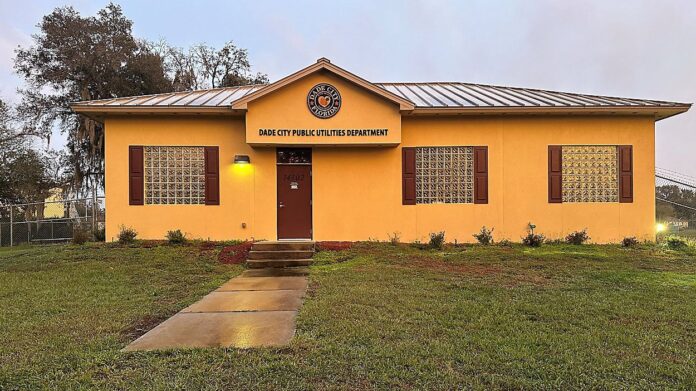DADE CITY, Fla. — A long in-the-works effort to move Dade City’s wastewater treatment plant out of the Mickens-Harper neighborhood got some momentum Wednesday.
The city received $1.75 million for the project from the U.S. Environmental Protection Agency.
“I was super excited because this has been a goal for the commission and the city for so many years,” said City Manager Leslie Porter.
What You Need To Know
- Dade City received $1.75 million from the EPA to relocate and upgrade its wastewater treatment plant
- City leaders have discussed moving the plant for more than a decade, but funding has been an issue
- The plant was built in the historically Black Mickens-Harper neighborhood in the 1950s
- City Manager Leslie Porter says an upgraded plant is important to meet the needs of Dade City’s rapidly growing population
The current facility sits on Delmar Street and Irvin Avenue. Fredric Gray lives a few blocks away, and while you can’t see the plant from his house, he said it’s hard to forget it’s there.
“If you come home every day and you smell it, smell it, smell it, that’s not a good thing,” Gray said. “You know what raw sewage smells like? It’s not good.”
Other neighbors Spectrum Bay News 9 spoke with said the smell — and the plant in general — aren’t problems in the neighborhood. Porter said it’s another issue the city seeks to correct by relocating.
“The city recognized that was an environmental justice issue, putting that plant back there in the 1950s in a historic African-American neighborhood,” she said.
According to Porter, the city commission has talked about moving the plant since 2011, but funding has been an issue.
She said money was included for the project in last year’s budget, but that was later vetoed by Gov. Ron DeSantis.
Rep. Gus Bilirakis’s office said the latest funds from the EPA were secured by Bilirakis as part of the Consolidated Appropriations Act of 2022, which funded 483 water infrastructure projects nationwide.
“I am proud to have secured this funding for a project Dade City and the residents of Mickens-Harper have hoped for since 2011, and I’ll keep working to address water quality issues throughout Florida’s 12th Congressional District,” Bilirakis said in a statement.
Porter said the EPA money, along with $1.5 million in state appropriations, gets the city three-quarters of the way to funding the design process. She said the city will pay for the remaining 25%.
It’s not just the financial resources that are spurring the project forward.
“Currently, we have enough capacity,” Porter said of the treatment plant. “But what’s happening is with the explosion and the popularity of Dade City, we are looking to more than double our size in five-to-ten years. So, that has been the other key that is enabling us to move the project forward. Because while the commission always knew it was important, until the need was there and some of the additional funding, it wasn’t able to be a reality.”
Porter said another plus is the new plant will include advanced technology to better protect the environment.
The total cost of the relocation and upgrade is estimated at $49 million. Porter said system development charges for the new construction happening across the city will help pay for the project, and the hope is that additional grant funding and state appropriations may also be on the way. The city could also look at raising water and sewer rates to help cover costs.
Porter said the new facility would be built on city-owned land on Sumner Lake Road, a less populated area than Mickens-Harper. The current facility would be decommissioned and turned into a neighborhood park.
“Great — have more parties, more of my family coming over, won’t be embarrassed by the smell,” Gray said when asked what he thought about the planned relocation.
He and the rest of Mickens-Harper still have a wait ahead of them. Porter said the design and permitting process is expected to take two years. After that, the next steps will be determined by how much money the city has secured for the project.








